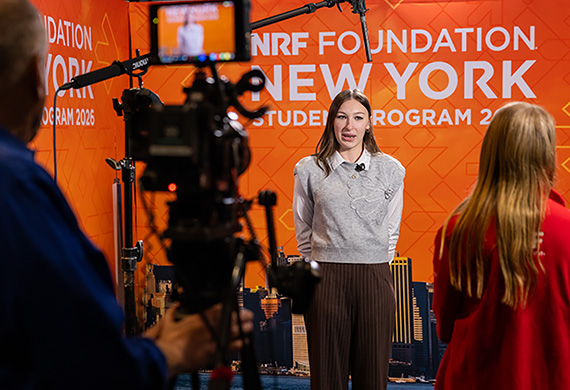Courses That Captivate

Dr. Sang-Keun Yoo, who teaches K-Pop, Film, and Dramas this fall, poses for a portrait in front of a TV showing the Kpop Demon Hunters movie. Photo by Nelson Echeverria/Marist University.
October 28, 2025 — Behind every packed classroom at Marist is a story—a dynamic professor, a creative curriculum, or an unexpected topic that sparks curiosity. These sought-after courses represent some of the best of Marist teaching: engaged learning that challenges, inspires, and stays with students long after finals week. While there are far too many examples to include, this short list—based on Registrar data, student feedback, and faculty insights—highlights a few classes that consistently captivate students.
Course Spotlight: K-Pop, Film, and Dramas
Professor: Sang-Keun Yoo
Get ready to stream, analyze, and debate your way through the global phenomenon of Korean pop culture. In K-Pop, Film, and Dramas, students explore how K-pop, Korean films, and streaming dramas shape conversations about identity, media, and technology worldwide. The class is hands-on and multimedia-rich: think music video labs, comparative interviews on Korean and American culture, and Zoom talks with international scholars and industry pros. From TikTok fandoms to AI-generated idols and fashion trends, students connect classroom analysis with real-world cultural production — proving that K-pop isn’t just catchy, it’s a lens on global culture.
A highlight of the course is the exploration of K-Pop Demon Hunters, which students examine to understand why it became a worldwide sensation—outshining even Gangnam Style, Parasite, and Squid Game. Class discussions ask what these global hits share and what makes K-Pop Demon Hunters stand apart. Can it be read as a feminist work, given its powerful female leads? Students also explore the film’s distinctive vision of the afterlife—fluidly intertwined with the living world—making it a rich case study for how Korean pop culture blends tradition, innovation, and global appeal.
Course Spotlight: Game Design
Professor: Kat Schrier
If you’ve ever wondered what makes a game truly engaging, this class is your portal to finding out. In Game Design, students don’t just play games — they build them. From board games to digital narratives, you’ll learn how to craft worlds, design rules, and create experiences that keep players coming back for “just one more round.”
No coding experience? No problem. This course is all about creativity, strategy, and storytelling — the art of making play meaningful. Through brainstorming, prototyping, and a lot of playtesting, students discover that designing a great game isn’t child’s play… but it’s definitely fun.
Students in the Capstone class of the Games and Emerging Media Program, a more advanced course taken after Game Design. Photo by Carlo de Jesus/Marist University.
Course Spotlight: Advanced Topics in Entrepreneurship
Professor: Walter Recher
If you’ve ever dreamed of starting your own business (or just love picking the brains of people who have), this is the class for you. Students dive into launching new ventures, buying existing businesses, pricing, financing, supply chains, staffing, and succession planning — the real-world mechanics of making a business succeed.
What makes this course truly stand out are the guest speakers that Lecturer Recher brings in from diverse industries with firsthand experience and practical insights. Drawing on strong connections with organizations such as the New York State Chamber of Commerce and a regional Economic Development Council, Recher also guides students in developing and pitching award-winning business plans. The course’s real-world lessons stick, giving students knowledge they can actually use long after graduation. Students rave about Recher, calling him one of the best at Marist — engaging, knowledgeable, and deeply invested in helping every student get the most out of the class.
Course Spotlight: The Ethics of Food
Professor: Joseph Campisi (and others)
Blending philosophy with real-world relevance, The Ethics of Food is one of Marist’s most enduring and universally relevant Liberal Arts courses. Students study foundational ethical theories—then apply them to urgent questions about how food is produced, distributed, and consumed.
Through lively discussion, students grapple with questions such as: Is it ethical to eat meat? Should genetically modified foods be labeled? Students not only explore these ethical questions in the classroom but also get hands-on experience in Marist’s garden, growing vegetables and herbs. Dr. Campisi emphasizes the process behind our food, sharing lessons from his mother: Food is not just quick and easy—it’s a journey that deserves attention and care. By cultivating lettuce, herbs, and other crops, students witness the effort and growth involved, learning to slow down and truly appreciate what they eat.
Assistant Professor Joe Campisi (center) with students in the Community Garden at Marist. Photo by Nelson Echeverria/Marist University.
Introduction to Law
Lecturer: Annamaria Maciocia
Few courses at Marist fill up faster than Introduction to Law—a cornerstone of the Pre-Law and Paralegal Studies programs that draws students from across majors who are curious about the legal system. Dual-listed with Political Science, this three-credit Liberal Arts course offers an engaging introduction to legal studies, exploring major areas of law, the functions of paralegals, and the ethical and professional responsibilities of the field.
Much of the course’s popularity stems from Professor Maciocia, whose students consistently describe her as “thorough, comprehensive, and incredibly dedicated.” Known for her step-by-step clarity, warmth, and humor, Professor Maciocia makes complex legal concepts accessible while holding her students to high academic standards. Her approach blends rigor with genuine care—she’s praised for her extensive office hours, real-world insight, and unwavering commitment to student success.
Annamaria Maciocia teaches a Summer Pre-College Pre-Law program. Photo by Carlo de Jesus /Marist University.
Course Spotlight: The History of Opera in Florence (Study Abroad Course)
Professor: Marina Melita
In the city where opera was born, Marist Italy students experience the art form in its most authentic setting. The History of Opera in Florence traces opera’s evolution from its 16th-century beginnings with the Camerata dei’ Bardi to its modern interpretations on Florence’s stages today. Through readings, live and screened performances, and visits to iconic cultural sites, students explore how Florence shaped one of the world’s most enduring art forms.
The class blends scholarship with experience—students attend performances at the Maggio Musicale, tour the Giacomo Puccini Museum in Lucca, and explore the Franco Zeffirelli Foundation to see the famed director’s intricate sets and costumes. It’s an immersive journey through history, music, and design that brings the magic of Italian opera vividly to life. Note: If you aren’t lucky enough to catch this course abroad, Melita offers a Poughkeepsie campus version with trips to the opera in New York City.
A scene from the opera Il Ciro, the jewel of Alessandro Scarlatti, on stage at the Maggio Musicale, where the History of Opera students attend a performance. Courtesy photo from Maggio Musicale Instagram.
Course Spotlight: Honors First Year Seminar
Professor: Varies
The Honors First Year Seminar is a cornerstone of the exceptionally selective Honors Program, which attracts some of the brightest students from across the country. Designed to challenge and inspire, this four-credit seminar immerses first-year Honors students in an intellectual community that values curiosity, collaboration, and interdisciplinary thinking.
One example, Animals in Literature and Pop Culture. Through lively discussion and creative projects, students examine everything from chimpanzee communication and elephant empathy to the ethics of animal experimentation. Along the way, they tackle big questions about empathy, identity, and responsibility toward other species.
As one of the first steps in the Honors experience, all of the First Year Honors seminars set the tone for the rigorous and rewarding academic journey that defines Marist’s top scholars.
Course Spotlight: Genetics
Professor: Luis Espinasa
Taught by the adventurous Professor Luis Espinasa—who explores caves and mountains worldwide—this Genetics course offers students a rare hands-on experience with real scientific discovery. Unlike typical classes using standard kits, students analyze DNA from genuine, scientifically valuable specimens collected by Espinasa in caves, many representing newly discovered or undescribed species.
Rather than working with generic samples, students analyze unique organisms such as blind cave fish, depigmented animals, and rare cave insects. They engage in authentic research that expands biological knowledge beyond textbooks. The results of their DNA sequencing projects are so significant that they often contribute to peer-reviewed scientific publications. Undergraduate students frequently co-author papers with Espinasa’s research team at an average of over two student-involved publications each year. This course provides a remarkable opportunity for students to directly participate in frontier genetics research and make meaningful contributions to science.
Dr. Luis Espinasa explores the Calera cave system in Mexico, discovering fossils of 775 specimens that date back to the Ice Age. Photo courtesy of Luis Espinasa.



